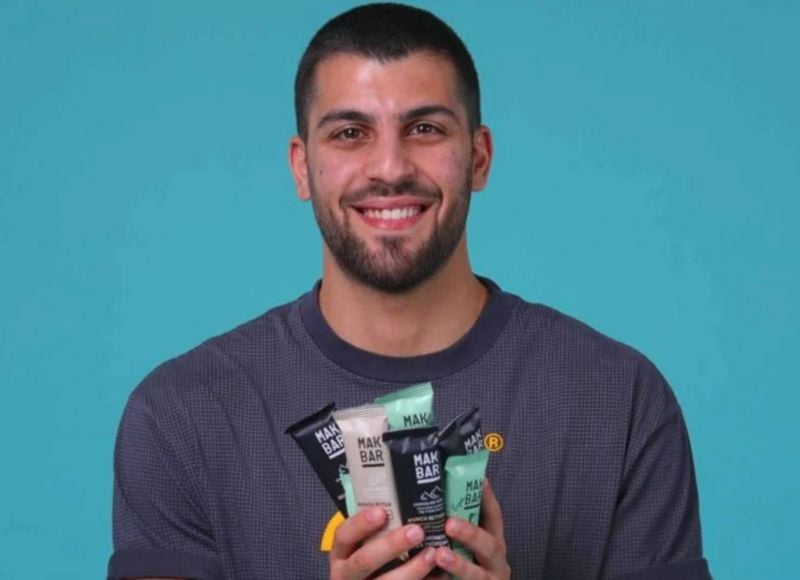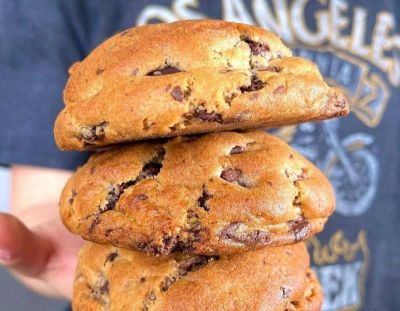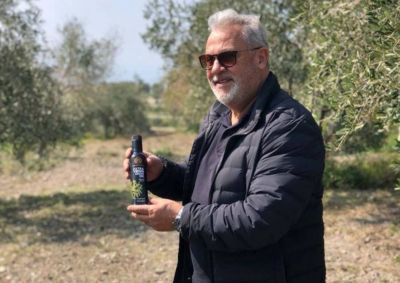
Ziad Makdessi with his Mak Bars.
Mak Bar has gradually entered the Lebanese market over the past three years. These sugar and preservative free protein bars have quickly become a success.
“It is a healthy snack, made of ingredients that are good for you, with nutritional benefits stated [on the package],” said Mak Bar founder Ziad Makdessi. These bars are not just aimed at sports enthusiasts.
“I want to break the bad reputation that protein bars have — that they target exclusively athletes and do not taste good.”
The 27-year-old entrepreneur’s protein bars are coated with chocolate, and there is a good reason behind this. His family has been in the chocolate business for more than 30 years.
An obsession
While pursuing his studies in chemical engineering, Makdessi, an avid sports fan, had the idea of making protein bars in Lebanon.
“I used to take my snacks with me to the gym. So I thought, why not put them all together in one bar, without adding any preservatives,” he said.
He talked to his friends and family about his idea. While some encouraged him, most tried to dissuade him.
With his diploma in hand, he moved to Warwick University in the UK, where he started a masters in business management. But he didn’t forget his project. “The idea haunted me,” he said.
He talked about it to his colleagues and even to his teachers. “I was obsessed,” he said.
One day, his brother sent him a link to an article about Peter Rahal, a Lebanese-American entrepreneur, who sold his protein-bars company, RXBar, for $600 million to US food giant Kellogg’s.
Makdessi packed his bags and returned home in 2017. He wanted to prove that his idea was viable and that the Lebanese market was fond of protein bars.
A shaky start
The early days of Mak Bar were long and fraught with difficulties. Makdessi started from scratch. “No one in Lebanon was producing them. I couldn't ask anyone for advice,” he said.
He used the kitchen of his family home in Fanar to test his recipes, using his friends as guinea pigs. His biggest challenge was to find a way to preserve his bars without adding preservatives.
Two and a half years later, he finally perfected his recipe and process.
“I tried out at least 300 different recipes to come up with the five flavors we market today” — Peanut Butter, Hazelnut Crunch, Chocolate Chip, Cookies 'N' Cream and Choco Vanilla.
“One of my main objectives was to make a bar that would not stick to the teeth and palate.”
The end product was a chocolate-coated bar with a brownie-like texture.
As for the products used, Makdessi said he imports “most of the ingredients in order to guarantee a certain level of quality.”
The pea protein base comes from Switzerland, the almonds are brought from the USA, chocolate and caramel from Belgium, and dates from Saudi Arabia. The pea protein base is “considered to be the best source of vegetable protein, according to studies.”
And then, with the help of his brother Tarek, who is co-founder, he officially launched his brand in August 2020, “just three days” before the explosion at the port of Beirut.
“In solidarity with the victims,” he decided to delay the marketing campaigns on social media for a month, “although everything was ready,” he recalled.
The project takes shape
At first, he juggled hats as a chef, delivery boy, social media manager and accountant, but things are totally different today.
Along with his uncle, Fadi Salameh, he is now running a well-oiled machine of a business that has some 26 employees.
This includes design, marketing, and social media management. The distribution of tasks was necessary for him to focus on his company and keep pace with its growth.
He started producing 1,000 to 2,000 bars a month, but the trend in sales was unexpected. An average of 10,000 bars were sold per month in 2021, 25,000 bars in 2022 and over 50,000 bars in the first few months of 2023.
This is impressive, considering that this work is done from the basement of the building where he lives.
“We had to start from square one to organize the space and make it compliant with health regulations,” he said.
Then, “with the help of my architect uncle, we gradually optimized the space available to maximize our production capacity,” he added.
Gone are the days when everything was made by hand in the small kitchen at home.
In all, over $500,000 in funds were invested progressively to transform the space, purchase the machinery needed to produce and standardize the quality of the snacks.
This fitting enabled Mak Bar to expand its production capacity and export its products.
Today, 60 to 65 percent of the company’s production is sold in Lebanon, through more than 700 retail outlets, including supermarkets, gyms, pharmacies and health clinics. Bars with 11 grams of protein are sold at $1.2 a bar, and those with 18 grams of protein are sold $1.5.
The remaining 35 to 40 percent of the products are sold in the United Arab Emirates under the same label, and in the UK on behalf of English equipment manufacturer Everlast, which it resells under its own brand.
Mak Bar’s goal in the near future is to export to other countries in the Middle East and to enter the European market. This goal, however, requires an expansion of the production line and the factory’s relocation.
“Given the banking paralysis due to the crisis, our priority today is to find and establish partnerships with international organizations in order to secure new funding that would help us expand our production line and, consequently, our revenues,” said Salameh.
This funding would also go towards diversifying Mak Bar’s products. What would they be? “You'll just have to wait and see,” said Makdessi.
This article was originally published in French in L'Orient-Le jour. Translation by Joelle El Khoury.
- A culinary journey from Beirut to Brussels cooks up tradition, love and teta's recipes
- In Tripoli’s Bab al-Tabbaneh and Jabal Mohsen, ex-rival fighters light up former frontlines with solar energy
- Savvy Element: Finding a niche in the local self-care and home-care market, despite Lebanon’s crisis

